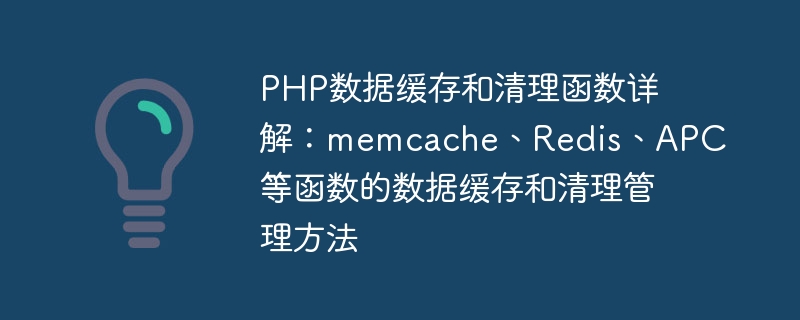

Detailed explanation of PHP data caching and cleaning functions: Data caching and cleaning management methods for memcache, Redis, APC and other functions
Introduction:
In PHP development, Data caching and cleaning is a very important part. Reasonable use of cache can improve website performance, and the cleanup management function can help us release occupied memory resources in a timely manner. This article will introduce in detail the commonly used caching components memcache, Redis, and APC in PHP, as well as their data caching and cleaning management methods, and provide specific code examples.
1. Memcache caching system
// 连接到Memcache服务器 $memcache = new Memcache; $memcache->connect('localhost', 11211); // 设置缓存数据 $memcache->set('key', 'value', false, 3600); // 获取缓存数据 $value = $memcache->get('key');
// 连接到Memcache服务器 $memcache = new Memcache; $memcache->connect('localhost', 11211); // 清理过期数据 $memcache->flush();
2. Redis cache system
// 连接到Redis服务器 $redis = new Redis; $redis->connect('localhost', 6379); // 设置缓存数据 $redis->set('key', 'value'); $redis->expire('key', 3600); // 获取缓存数据 $value = $redis->get('key');
// 连接到Redis服务器 $redis = new Redis; $redis->connect('localhost', 6379); // 设置缓存数据,并指定过期时间 $redis->set('key', 'value', 3600); // 不需要手动清理过期数据
3. APC cache system
// 设置缓存数据 apc_store('key', 'value', 3600); // 获取缓存数据 $value = apc_fetch('key');
// 清理缓存数据 apc_delete('key');
Conclusion:
Through the introduction of this article, we have learned about the data caching and cleaning management methods of memcache, Redis, and APC, the cache components commonly used in PHP, and also provided Specific code examples. Reasonable use of data caching and cleaning operations can improve website performance and effectively manage memory resources. I hope this article will be helpful to your data caching and cleaning operations in PHP development.
The above is the detailed content of Detailed explanation of PHP data caching and cleaning functions: data caching and cleaning management methods for memcache, Redis, APC and other functions. For more information, please follow other related articles on the PHP Chinese website!